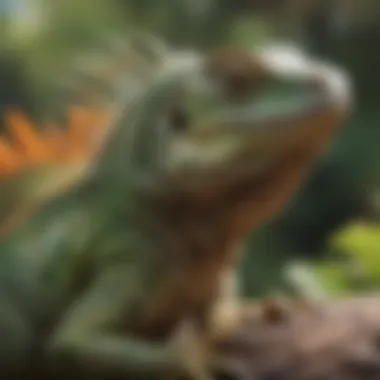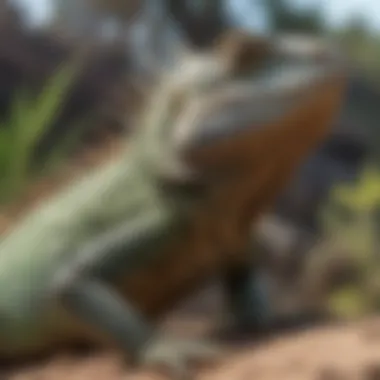Understanding Iguanas: Assessing Risks of Ownership


Intro
Understanding iguanas as pets involves appreciating both their captivating demeanor and the inherent dangers they might present, especially for inexperienced owners. While they can seem friendly and engaging, these reptiles come with complex needs that, if not met, can lead to complications. Their unique behavior patterns, dietary requirements, and environmental needs all contribute to the potential risks associated with owning an iguana. This article aims to dissect these elements, ultimately allowing both current and potential owners to make informed and responsible decisions.
Iguana Care Basics
Importance of Proper Nutrition
A correct diet for iguanas is crucial. They primarily require a variety of leafy greens, fruits, and some vegetables. Calcium and Vitamin D3 are essentials for preventing metabolic bone disease. Mistakes in diet can lead to health complications quite rapidly. Many owners might not recognize signs of dietary distress until it’s unfortunately too late.
Understanding Iguana Species and Their Needs
There are various species of iguanas, each with distinct behaviors and care requirements. The Green Iguana is widespread, known for its size and color. In contrast, the Lesser Antillean Iguana is smaller, with unique characteristics. Understanding the specific needs of the breed assists owners in avoiding common issues, such as aggression or health complications.
Basics of Iguana Habitat Setup
Creating an adequate habitat is critical. A proper enclosure should replicate their natural environment as closely as possible. This includes heat sources, humidity levels, and climbing spaces. If the environment is not appropriate, stress and health issues can rapidly develop. Fans of iguanas must take these factors seriously for a suitable living space.
Grooming and Hygiene Tips
Maintaining good hygiene is vital. This involves regular cleaning of their environment to prevent infections and health issues. Some iguanas require assistance in shedding, while others enjoy occasional baths. Regular health checks can reveal problems before they escalate. Owners need to familiarize themselves with their pet's grooming needs.
Understanding Iguana Behavior and Threats
Aggression and Communication
Iguanas can display aggressive behavior. Signs include head bobs, tail whips, and open-mouthed threats. Recognizing these signs is key to preventing bites. Frightened or stressed iguanas might also react defensively, making it essential for owners to know their pet's mood.
Health Risks to Owners
Even healthy iguanas can pose health risks such as potential Salmonella transmission. Practicing good hygiene—like washing hands after handling—is non-negotiable. Proper precautions protect not only the owner but also other pets and children in the household.
Environmental Hazards to Consider
Extreme temperatures and humidity can lead to more minor or major health scares. Iguanas do not thrive well in several conditions. Owners must avoid drafts and be mindful of flooring materials and chemicals used near their habitats.
Summary and Important Takeaways
Understanding iguanas includes recognizing their dietary needs, behavioral traits, and health risks. This knowledge enables responsible ownership. To secure a relationship with these animals, educating oneself is essential. Growth in understanding fosters a safe, healthy, and engaging bond between an owner and their iguana, ensuring both parties can coexist amicably. Owners are encouraged to stay engaged with reptile health resources.
Prelude to Iguanas and Their Popularity
The increasing popularity of iguanas as pets raises important question regarding their safety and suitability for household environments. As fascinating reptiles, they attract many casual pet owners; however, their complex needs often remain underappreciated. Understanding what makes iguanas appealing and the historical context behind their domestication provides a foundational perspective crucial to recognizing their potential dangers.
Historical Context of Iguanas as Pets
Iguanas have a unique place in the pet trade that dates back numerous decades. Originally revered in their native habitats, primarily in Central and South America, these reptiles have been kept by various cultures for their beauty and symbolism. As the trend of exotic pets gained momentum in the late 20th century, the trade expanded, leading to more informed and un-informed buyers entering the market.
The inception of the iguana as a common household pet took off during this period, with demand rapidly increasing. Once considered specialized creatures for enthusiasts, their availability soared through pet shops, often marketed with little detail about their required care. This historical expansion has had lasting effects, given that many new owners are unaware about the intricacies of iguana care, which might lead to misconceptions and mismanagement of their needs.
Reasons for Iguanas' Appeal in the Pet Trade
A range of factors contribute to the alluring image of iguanas as pets. First and foremost, their striking appearance and size cannot be overlooked; they possess unique colors and patterns. Many people consider them less common than traditional pets, leading to a desire for more exotic companion animals.
- Intelligent Creatures: Iguanas are intellectually stimulating, capable of forming connections with their owners despite their reticent nature.
- Minimal Noise: Unlike some other pets, iguanas do not make loud noises, making them a fitting choice for individuals living in quieter environments.
- Long Lifespan: With a potential lifespan reaching up to 20 years under proper conditions, an iguana can be viewed as a long-term companion.


However, it is vital for individuals interested in acquiring an iguana to also dissect the implications tied to their ownership. Comprehending both the charms and challenges that accompany having an iguana significantly lays groundwork for responsible parenthood. As the next sections will outline, each interaction with iguanas requires a well-rounded, informed approach to safeguard both the owners and the reptiles obtained to maintain their well-being.
“Ignoring the responsibility inherent in iguana ownership will lead to adverse outcomes for oneself and the pet.”
Behavioral Traits of Iguanas
Understanding the behavioral traits of iguanas is essential for anyone considering them as pets. Knowledge of their natural instincts can provide insights that enhance ownership, impacting both the iguana’s well-being and the owner's experience. Iguanas exhibit a range of behaviors that can tell you much about their mood, health, and environment. Highlighting these traits can help prevent misunderstandings and potential dangers during their interaction with humans. Below is an in-depth look into several key aspects that define iguana behavior.
Natural Instincts and Their Impact on Behavior
Iguanas are inherently wild creatures, and their natural instincts influence their behavior. They are adept climbers, using their limbs and tails for protection from predators. This instinctual nature can be observed in their everyday actions. For example, iguanas often relate to their surroundings by climbing and seeking high places. Their desire for height prompts them to escape to elevated positions when they feel threatened. This can present risks if the enclosure or environment is designed without considering this natural behavior.
By understanding these instincts, pet owners can create environments that fulfill iguanas’ needs, reducing stress and risk of escape. Such environments might provide climbing structures or safe outdoor time within secure boundaries.
Signs of Stress or Aggression in Iguanas
Recognizing stress and aggression in iguanas is critical for their health and safety. Signs may include tail whipping, hissing, or a puffed-up body stance. These behaviors signal that the iguana feels threatened or unwell. Detailed observation is necessary. A stressed iguana may also refuse food, which can lead to significant health issues if persisting. Contrast between calm and aggressive behavior is often stark, where normal relaxation resembles a flattened posture with a calm demeanor.
Seeing your iguana displaying aggressive marks often indicates that it may require immediate changes in its habitat or its handling techniques. Awareness can thus empower owners to swiftly change conditions to mitigate these signs.
Understanding Iguana Body Language
Iguana body language communicates much about their state of mind. Here's an overview of typical postures:
- Head bobbing: This can suggest assertiveness or serve as a mating display.
- Color change: Bright colors might signify health and alertness, while darkened tones can indicate stress or illness.
- Laying flat against surfaces: This can denote relaxation but can also signal submission or fear in response to perceived threats.
- Tail position: A tail held straight up usually indicates confidence; a tucked tail indicates fear.
Mastering these body language cues allows owners to react appropriately, enhancing the bond between them and their iguanas. Understanding their perspectives can foster an engaging and fulfilling relationship developed from respect and awareness.
Observing and interpreting your iguana's body language is key to recognizing its emotional states and needs, facilitating smoother human-iguana interactions.
With substantial information about behavioral traits, prospective owners can benefit greatly from deeper insights that frame more empowering contexts for both them and the iguanas. This understanding cultivates an enriching atmosphere where the risks of misunderstandings drastically diminish.
Physical Risks Associated with Iguanas
Understanding the physical risks associated with iguanas is essential for anyone interested in keeping these reptiles as pets. Given their unique biology, behavior, and habitat needs, iguanas can pose several physical dangers not only to themselves but also to their owners. This section explores bite risks, environmental hazards, and the dangers of falls. Each aspect contributes to the broader picture of responsible iguana care and highlights why awareness is crucial.
Bite Risks and Their Implications
Iguanas can bite, and these incidents can lead to significant injury. Located in their jaws are powerful muscles designed for chewing tough vegetation. When provoked or scared, iguanas may see no alternative but to defend themselves. The bites can lead to puncture wounds that are painful and prone to infection. Owners who mishandle their iguanas or don't understand their behavioral signals may suffer these bites, emphasizing the need for training and proper interaction techniques.
- Infection Risk: Iguana bites can cause cuts that, if not treated, may become infected. It's critical to clean the wound and seek medical attention if necessary.
- Temperature Risks: Iguanas can carry bacteria known to impact humans negatively. This increases concern for owners, especially families with children.
Important: Always recognize your iguana's body language. Understanding stress signals helps keep both the iguana and the owner safe.
Health Risks from Iguanas' Environment
The environmental conditions needed for proper iguana care can inadvertently present risks. Iguanas require heat, humidity, and space to thrive. If these factors are neglected, iguanas can face serious health issues that may affect how they interact with their owners.
- Mold and Parasites: Poor handling of habitat hygiene can lead to mold growth and parasites, binding illness. These factors not only affect iguanas but can also impact family health.
- Unbalanced Diets: Many owners make the mistake of feeding their iguanas inadequately balanced diets. This leads to Nutritional Metabolic Bone Disease, resulting in severe complications.
- Inadequate Lighting: Correct lighting is essential for an iguana’s overall health, particularly UVB light for Vitamin D synthesis. Without it, iguanas may experience paralysis or weakness, affecting their movement and interactions.
Injuries from Falls and Escapes
Iguanas are naturally agile creatures. However, when kept in unsuitable environments, falls can occur. Iguanas may escape from their enclosures, leading to hazardous situations around your home environment.
- Escape Risks: An unsecured habitat can lead to escapes, possibly injuring the iguana and creating problems for pets or children at home. It is wise to ensure cages have secure doors and walls.
- Fall-related Injuries: Falls from perches or cages can lead to broken limbs or internal injuries. Providing a safe, stimulating environment with appropriate climbing structures can mitigate this risk.


Owning an iguana demands attention to these physical risks. Owners should aim to understand the unique challenges that come with keeping such pets.
By focusing on proactive care, iguanas can be maintained in a way that minimizes risk, leading to a safe warm home for both the reptiles and their human owners.
Health Concerns in Iguana Care
Iguanas, like all pets, require special attention when it comes to health. Understanding health concerns in iguana care is essential not just for the animal's well-being, but also for the safety of their owners. Any pet can bring happiness but also some risks if not looked after properly. Iguanas can develop several health issues that improperly informed owners may overlook. Recognizing these matters is a vital part of responsible ownership.
Common Illnesses in Iguanas
Iguanas can face a variety of common illnesses. Some may seem minor, while others can become life-threatening if not treated promptly. Recognizing the signs of these illnesses is crucial. Common ailments include:
- Metabolic Bone Disease (MBD): A significant nutrition-related disorder, MBD lacks calcium and vitamin D3. It can cause deformities and even lead to death if neglected.
- Respiratory Infections: Signs include labored breathing, nasal discharge, and lethargy. Often a result of inadequate heating or humidity in the habitat.
- Parasites: External parasites like mites, as well as internal parasites like worms, can cause various health problems.
- Dermatitis: Skin issues are common in iguanas. They often stem from bad shedding conditions or environmental factors affecting skin hydration.
Keeping an eye on the iguana for signs of illness can mean the difference between swift treatment and severe complications.
Preventative Health Measures
Preventative measures are crucial for keeping iguanas healthy and happy. Informed owners can take several proactive steps:
- Proper Nutrition: Offering a balanced diet high in leafy greens and calcium is essential. Avoid feeding solely fruits, as they are often high in sugar.
- Regular Veterinary Check-Ups: A vet who specializes in reptiles can perform check-ups to see any hidden health concerns.
- Hygiene Maintenance: Clean the iguana’s habitat regularly. Removing waste and uneaten food can help prevent diseases.
- Optimal Care Environment: Ensure the right temperature and humidity levels. This can greatly minimize stress and potential illnesses.
Staying informed about health issues and practices can enhance the quality of care iguanas receive.
Implementing these measures lays a solid foundation for a long, healthy life for these exotic pets. The right habitat, suitable diet, and hygiene can reduce risks significantly and ease common health woes.
Environmental Needs of Iguanas
Understanding the environmental needs of iguanas is crucial in ensuring their well-being. These reptiles are not suited for average household conditions. If not provided with their specific habitat requirements, iguanas can become stressed, sick, or even die. Their natural environment vastly differs from what most owners can simulate at home, which necessitates careful planning by the owners.
Proper environmental conditions include adequate space, suitable substrate, and various hiding spots for iguanas. Simplistically put, the space directly correlates with their size. A larger iguana requires a larger habitat. Without the correct environment, behavioral issues can emerge, leading to potential aggression or fear.
Habitat Requirements for Safety
Iguanas need a secure and stimulating habitat. In terms of structure, an enclosure must be spacious. A minimum size is often debated, but a recommendation is at least 6 feet long and 3 feet wide for adult iguanas. One key point is that vertical space matters because iguanas like to climb. Using shelves, branches, or platforms can help recreate their natural environment. Inadequate size can cause leading stress.
Factors like substrate choice also play a critical role. Safe options must be used that will not harm their limbs or mouth. Some common substrate types include paper towels, slate tiles, or aspen shavings. Avoiding sand and wood chips is advised due to ingestion risks.
Additionally, creating shelters and hiding spots is essential. These can be offered with caves or leafy arrangements mimicking natural setups, allowing iguanas to retreat. This setup reduces stress levels during the adjustment to new environments or disruptions.
Maintaining Optimal Temperature and Humidity
Alongside space, temperature regulation and humidity are significant for iguanas. These reptiles are ectothermic and require a temperature gradient in their enclosures for thermoregulation. Generally, a basking spot should be around 95°F (35°C) to maintain proper metabolic function while the cooler end stays around 75°F (24°C).
Maintaining humidity between 70-80% is also important to support skin health and hydration. Dry environments can lead to problems like shedding issues. Regular misting of their enclosure, water features, or a dedicated humidity gauge can help maintain these levels.
Remember that awareness of the specific habitat, temperature, and humidity preferences should guide every interaction and arrangement.
Staying informed about these elements increases the likelihood of successful ownership and enhances the care iguanas receive.
Iguanas and Human Interaction
Understanding the dynamics of iguana and human interaction is essential for potential iguana owners. It highlights the responsibilities involved in keeping these reptiles as pets and sheds light on the guidelines that can foster a harmonious coexistence. Iguanas are not merely ornamental pets. Their successful integration into a household can significantly improve their well-being and reduces potential risks. Shortcomings in addressing their social needs can lead to stress or behavioral issues, illustrating that misguided interactions can harm both the iguana and the owner.
Socialization Techniques for Iguanas


Effective socialization of iguanas is crucial, especially for new pet owners. To develop a trusting and comfortable relationship, patience and understanding are key. Start by ensuring that your iguana feels secure in its habitat. Avoid sudden movements and loud noises as these can induce stress. Gradually introducing human presence can help them acclimate. A few techniques include:
- Slow Approach: Slowly approach your iguana while they are in their enclosure. Let them initiate contact to foster trust.
- Hand Feeding: Offering food by hand helps create a positive association with humans.
- Regular Handling: Gently handling them for short periods each day can reduce anxiety and increase comfort in human interactions.
It's critical to monitor their reactions. Some may enjoy human interaction while others may feel threatened. Respect their boundaries to ensure a positive relationship.
Educating Families About Iguanas
When an iguana becomes a part of the family, comprehensive education is vital. Share knowledge with family members so everyone understands the needs and characteristics of the iguana. This understanding helps reduce the likelihood of misunderstandings and potential injuries.
Points to consider include:
- Lifespan Awareness: Iguanas can live for several decades, making long-term commitment necessary.
- Behavioral Patterns: Inform your family about normal iguana behaviors like basking, hiding, or being aggressive when stressed.
- Dietary Requirements: Educate on proper feeding habits and food types that support iguana health.
Quote: _
Legal and Ethical Considerations
Understanding the legal and ethical aspects of iguana ownership is crucial for all individuals contemplating bringing one of these reptiles into their lives. Floridally written laws can impact how one approaches ownership and care. Furthermore, acknowledging the ethical implications can guide better practices in the well-being of these animals. Knowledge in this area helps prospective owners navigate laws and make humane choices that promote a healthy environment for their iguanas.
Legal Restrictions on Iguana Ownership
Many regions impose legal restrictions on iguana ownership aimed at protecting both people and reptiles. These laws can differ widely based on geographical area.
For instance, in the United States, the state of Florida considers iguanas an invasive species, leading some counties to have restrictions on their ownership. In contrast, some states may require permits to own certain species, like the Green Iguana. Failure to comply with these regulations can result in legal penalties. It is crucial for prospective owners to verify local laws before purchasing or adopting an iguana.
Some restrictions in various regions include:
- Permit requirements: Owners may need specific permissions.
- Banned species: Certain breeds may be entirely illegal to own.
- Sale and transfer laws: There might be controls on how iguanas can be sold or given away.
Understanding these rules protects both the iguana and the owner. A careful review of legal stipulations greatly influences responsible ownership.
Ethical Treatment of Iguanas as Pets
Ethics in ownership is as vital as legal compliance. Treating iguanas ethically involves considering their natural needs and supporting their well-being. Owners ought to be proactively adopting measures that affirm humane care.
Consider these factors when treating iguanas ethically:
- Adequate habitat and care: Providing a space that's conducive to health, including proper temperature and humidity.
- Regular veterinary check-ups: These are essential to for monitor health problems that might arise.
- Education and knowledge: Understanding iguanas' behavior can help owners find ways to socialize and build bonds with their pet effectively instead of invoking stress.
- Rescue over purchase: Supporting rescuations can promote better treatment while offering animals a second chance.
Ethically pondering these issues reinforces a commitment to ensuring that iguanas have a higher quality of life. As pet owners become more educated about their intricacies, they begin meeting these creatures' needs elaborately.
Closure: Weighing the Pros and Cons
Evaluating the key aspects of iguana ownership is an important part of this article. By understanding both the benefits and dangers, potential owners can make informed decisions. Iguanas can be intriguing pets, but they also carry significant responsibilities. Their behavioral traits, care needs, and environmental demands require thoughtful consideration. Responsible ownership is not only about the love for lizards but also about meeting their specific needs.
Assessing Responsibility in Iguana Ownership
Owning an iguana involves far more than acquiring a pet. First, owners need to recognize the long lifespan of iguanas, often reaching twenty years or more. This necessitates a long-term commitment from the owner. The commitment must involve planning for routine care, which includes proper feeding, habitat cleaning, and regular veterinary check-ups. Owners must ask themselves if they are prepared for these ongoing responsibilities.
Environmental and dietary requirements also significantly factor into responsible ownership. Iguanas require a precise habitat that mimics their natural climate. Factors like temperature, humidity, and lighting need constant monitoring. Ignoring these conditions can lead to stress, illness, or worse consequences for the iguana. Moreover, understanding the iguana's dietary needs is crucial. Proper nutrition should consist of leafy greens and certain fruits, steering clear of harmful foods.
Moreover, understanding human-iguana interactions is crucial. Iguanas might become aggressive when stressed or mishandled, implying significant attention to socialization is important. If an iguana perceives threats, it can lead to biting or scrambling away, which demonstrates that owner skills must be adequate.
Final Thoughts on the Dangers of Iguanas
Despite iguanas being visually appealing and potentially friendly, their complexities pose risks to inexperienced owners. Prospective or current iguana owners should educate themselves about the emergency scenarios that could arise. Bites, environmental risks, and health issues are just a few possible challenges. Each day, iguana-related accidents occur, when unsuspecting owners underestimate these reptiles' needs and behavior.
Weighing pros and cons can ensure that the decision to keep an iguana aligns correctly with one's lifestyle. Not all homes are suitable for an iguana; therefore, careful thought is essential. Finding established online communities, such as those on Reddit, can provide valuable experiences and advice from seasoned iguana owners when deciding about ownership to make sufficient in excite about this responsibility.
In summary, iguanas are intricate creatures with specific care and handling requirements. A thoughtful and informed decision can help lead to enriching experiences for both iguanas and their owners, substantially reducing the risks associated with this unique pet.















